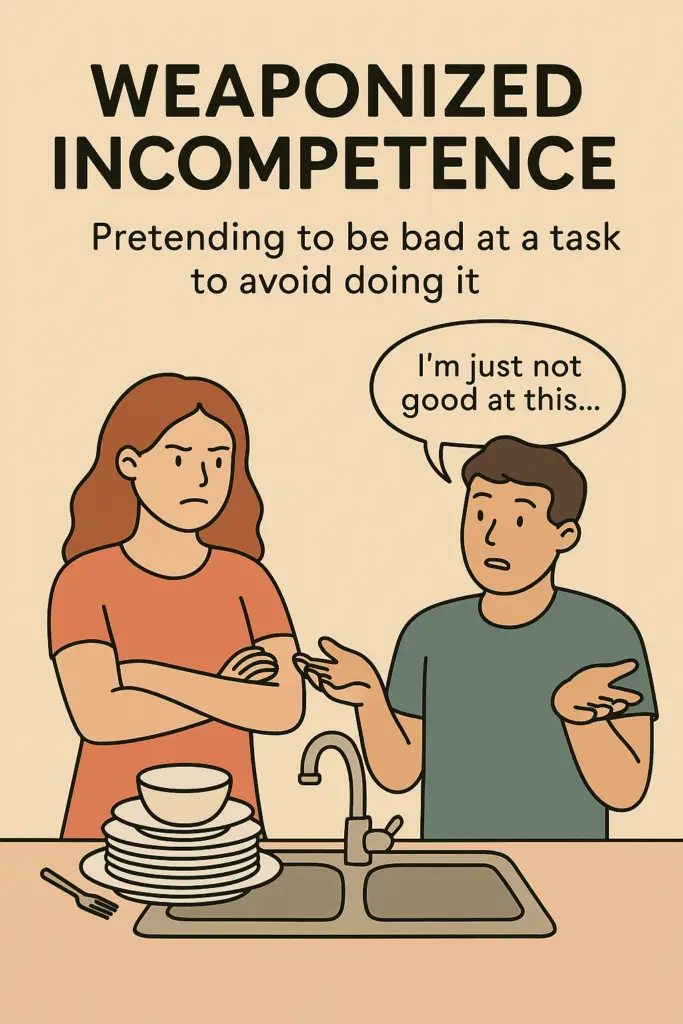When Doing the Dishes Turns Into Emotional Warfare
There’s nothing like the smell of fresh dish soap and unspoken resentment in the air.
It starts with a simple request:
“Hey, can you do the dishes tonight?”
What follows is a clattering symphony of broken routines and broken glass—forks still greasy, the sponge misplaced, water sprayed like a Jackson Pollock painting across the counter.
And then they say it:
“See? I told you I’m just not good at this stuff.”
Welcome to the messy battlefield of weaponized incompetence—where tasks go unfinished, responsibilities are dodged, and your partner insists they’re just “bad at it” while you quietly spiral into fury.
But here’s the thing: Is it laziness? Is it manipulation? Or is it something deeper?
In this post, we’ll unpack:
- What weaponized incompetence really is
- How it shows up in everyday relationships
- Why it’s so infuriating (and familiar)
- And how to shut it down with respect, boundaries, and a little bit of sass
What Is Weaponized Incompetence?
Weaponized incompetence (sometimes called strategic incompetence) is when someone pretends not to know how to do something—or does it badly on purpose—to avoid doing it at all.
Think:
- The partner who “can’t” load the dishwasher correctly, so you end up doing it.
- The roommate who buys the wrong kind of toilet paper every time until you stop asking.
- The coworker who “messes up” reports just enough that you redo them.
It’s not just being bad at something. It’s being selectively bad in ways that conveniently shift labor onto someone else.
Real-Life Examples: It’s Not Just the Dishes
Weaponized incompetence can show up anywhere—from the kitchen to the bedroom to the baby’s diaper. Some classics include:
- “You’re just so much better at this than I am.”
- “I don’t know what she likes in her lunch. You make it better anyway.”
- “I’ll mess it up, so you might as well do it.”
- “I’ll try, but don’t get mad if it’s wrong…”
It’s often framed as helplessness. But what it really says is:
“If I do it badly enough, I won’t be asked again.”
And suddenly, you’re doing everything—out of exhaustion, not agreement.
Why Weaponized Incompetence Is Infuriating (And a Little Bit Genius… In a Villain Origin Story Kind of Way)
Let’s be honest: it works. It’s a lazy person’s masterstroke. And that’s what makes it so maddening.
Here’s why it gets under your skin:
1. It Pretends to Be Harmless
At face value, it’s just “not knowing how.” But the deeper message is clear:
“I don’t value this enough to try. I’d rather let you carry the burden.”
2. It Forces the Other Person to Be the ‘Nag’
Suddenly, you’re not a partner—you’re a manager. A mom. A micromanager. Which, ironically, is what you were trying not to become in the first place.
3. It Turns Emotional Labor Into Emotional Warfare
Weaponized incompetence doesn’t just dodge tasks—it erodes trust, creates power imbalances, and leads to emotional burnout. You stop asking. You start resenting.
But Wait — Is It Always Weaponized?
Not necessarily.
Some people genuinely:
- Weren’t taught how to clean, parent, cook, or organize
- Have ADHD, learning differences, or executive dysfunction
- Feel overwhelmed and freeze
That’s why it’s important to look at the pattern, not the moment.
🚩 Is it repeated?
🚩 Is it always conveniently timed?
🚩 Is it specific to tasks they don’t want to do?
🚩 Do they show improvement when the consequences change?
If it’s consistent, self-serving, and never addressed—that’s when incompetence becomes a weapon, not a weakness.
Therapist’s Tips: How to Spot (and Stop) Weaponized Incompetence
Relationship and behavioral therapists agree—this behavior isn’t just about dishes. It’s about power, responsibility, and emotional equity.
Here’s how to handle it:
💬 1. Name It Without Shame
Tip: Say, “I’ve noticed that when you do [task], it tends to get left unfinished or done incorrectly. Can we talk about that?”
Start with curiosity, not accusation. If they genuinely didn’t know, this opens the door. If they did know, the game’s up.
🔄 2. Shift from Capability to Responsibility
Tip: Say, “Even if you’re not confident doing it, it still needs to be done. Let’s figure it out together.”
This removes the “I’m not good at it” excuse and reframes it as a shared adult responsibility—not a personality quirk.
🛑 3. Stop Fixing It for Them
Tip: If someone continues doing a task poorly, don’t swoop in. Let it sit. Let natural consequences play out.
Example: They do the laundry but leave it in the washer for three days? Let it mildew. The lesson will stick faster than a lecture.
🗣️ 4. Set Clear Expectations (Not Hints or Guilt Trips)
Tip: Be specific about what you want and when. “Can you take the trash out before 8 AM on Thursdays?” is better than “Ugh, it always smells in here.”
Vagueness creates loopholes. Clarity creates accountability.
❤️ 5. Use “Team Language”
Tip: Try “How can we divide things more fairly?” instead of “You never help with anything.”
This keeps the conversation collaborative instead of combative—and makes it harder for someone to play the victim card.
Bonus Section: The Sexy (and Not-So-Sexy) Side of Incompetence
Here’s where it gets interesting.
Some couples accidentally eroticize this dynamic. One partner takes charge of everything; the other plays helpless or “boyish,” and it turns into a weird powerplay.
Sometimes it’s hot. Sometimes it’s manipulation with a side of weaponized laziness.
Here’s how to tell the difference:
| Playful Dynamic | Problematic Pattern |
|---|---|
| It’s consensual & lighthearted | It creates real-life resentment |
| It’s balanced & switches roles | One person always defaults to helpless |
| It enhances intimacy | It erodes emotional connection |
| It’s a choice | It’s a burden |
If you’re both in on the joke and having fun, great. If one of you is drowning in responsibilities while the other pretends not to know how to load the dishwasher—it’s time to talk.
5 Cringe-Free Ways to Reclaim the Balance
Need practical steps to shift from “you’re bad at this” to “we’re both doing the work”? Start here:
1. Create a Weekly Task Swap
You do their least favorite chore; they do yours. It builds empathy, disrupts old habits, and levels the playing field.
2. Make a “No Rescue” Agreement
If one partner agrees to do something, the other agrees not to rescue, fix, or remind. Let natural consequences do the talking.
3. Schedule a “State of the Household” Talk
Once a month, check in. What’s working? What’s not? This keeps resentment from festering and normalizes talking about labor division.
4. Write a Joint “Adulting Manifesto”
Sit down together and write 5 things that define what being an adult partner means in your household. Make it funny, real, and honest.
Examples:
- We do not fear the dishwasher.
- We do not weaponize the laundry.
- We put effort into the unsexy parts of love.
5. Celebrate Competence
When your partner does show up, acknowledge it—without patronizing.
“Thanks for taking that off my plate” hits different than “Wow, you finally did it.”
Final Thoughts: Incompetence Isn’t Cute After a While
At the end of the day, you don’t need a partner who’s perfect—you need one who shows up. Who tries. Who learns. Who doesn’t pretend not to know how to fold a towel just to get out of doing it.
Weaponized incompetence might seem small on the surface, but over time it creates a chasm. It shifts relationships from equal partnerships to emotional hierarchies. And that’s not love. That’s delegation with feelings.
So if you’re tired of being the one who “just knows how” to do everything, speak up.
Because your time, energy, and peace of mind?
They’re not chores. They’re sacred.

